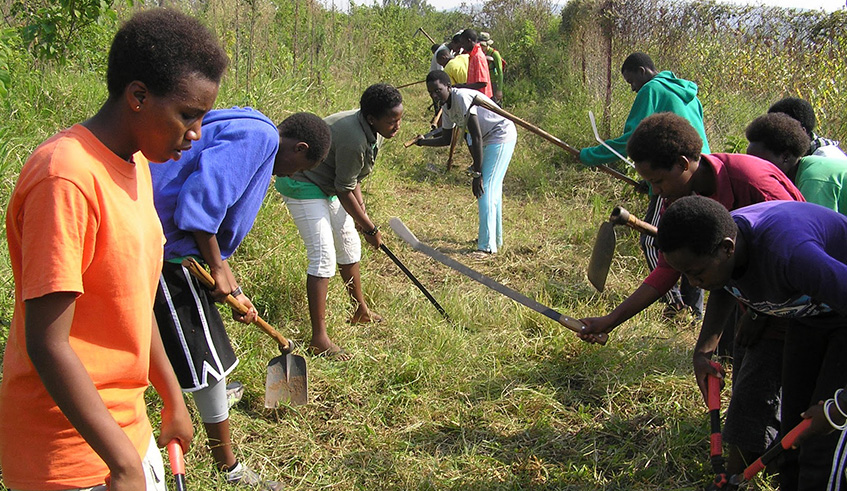

Last week, the cricket fraternity organised a week-long inter-regional tournament for children under the age of 15. Students from all regions of Rwanda engaged in cricket playing and were taken through different life skill activities.
There will also be an inter-school competition which will start this week and an ‘under 23’ tour that will include youth from the East African region.
Erick Dusingizimana, the national cricket captain, says that during school holidays, they always have such programmes.
He says they also get the chance to engage in other activities that are beneficial to them in general.
"The programme is committed to ensuring that children remain engaged in physical activity during school holidays. It also aims at keeping their minds occupied so that they don’t get time to engage in bad behaviour, which mostly happens when students are idle,” he says.
Why it’s important
Like the cricket programme, education experts believe that it’s important for learners to remain active all the time, more essentially, through physical activities that will keep them away from vices, and at the same time, keep them healthy.
Emma Byiringiro, a parent and the U-17 boys’ cricket team manager, feels that apart from keeping students fit and healthy, such activities boost students’ brain power.
Dusingizimana says that the better children are at these skills, the more confident and motivated they will be to keep on participating or try something new, in all areas.
"There are several coaching methods, but sports is a tool used for learners/youth to understand messages passed to them better; it is easier to learn while playing as opposed to being told,” he says.
For instance, Dusingizimana says, the programme includes educating the youth on HIV/AIDS and how to prevent it.
He says they normally use the cricket ball to demonstrate and pass the message.
"We have a technique that we use to pass this particular message to learners; the stumps (the three vertical posts that support the bails and form the wicket) are considered as life, the ball a disease and the bat protection,” he says.
He says the students enjoy this exercise and at the same time, understand what is required of them.
Why parents should be involved
Diana Nawatti, a teacher at Mother Mary Complex School in Kigali, says parents should encourage their children to take up various sports in order for them to be active. She says that a healthy mind brings out the best in a student.
She says students need to relax and take a break from classroom related activities; and sports gives them the opportunity to do that.
"By doing so, they are not only having fun, but also learning and exploring their talent,” she says.
From her experience as a teacher and counsellor, Nawatti says students who are active in sports normally improve academically and socially.
She, however, attributes the success to the diverse educational approaches and the interactions that students get when they participate in extracurricular activities, sports being one of them.
When students participate in different games, Nawatti says they get an opportunity to learn a lot which nurtures a seasoned person.
Byiringiro says it’s important for parents to support kids in games because they get motivated to do what they like if there is support from the people they love.
For parents or guardians to be in a position to help their children when it comes to sports, he says it starts with passion, and that they should observe what their kids are good at and what they like.
Byiringiro also says it might be hard for some parents to do that and so the best option is to seek help from coaches and build a strong connection with teachers.
He says knowing how to balance leisure and academics is important and students should be trained on that.
Byiringiro also says students who are not well informed or trained may decide to go overboard and think that their career is in the game, and some may even quit school to pursue this passion.
This, he says, should be avoided and students need to be helped to understand that even in games, one can only prosper if they are educated.
"An educated child will make a better sportsperson than someone with no knowledge from school,” Byiringiro says.
Impact
According to Francis Kazungu, a general practitioner in Kigali, such activities are important to school-going children.
He says that if this is made a tradition, it will help curb habits that many kids nowadays are hooked to, like internet games.
He points out that child obesity to some extent has to be blamed on technology. He says this is because most of them spend all of their time indoors on their gadgets, which discourages physical mobility, leading to obesity. Not forgetting the kind of food they consume that in most cases is not healthy, like burgers and fries.
Recent research published by SPARK, a marketing agency in San Diego, CA, USA, aimed at improving the overall health of children, adolescents, and adults, indicates that students need adequate amounts of physical activity throughout their lifetime.
It states that this does not only prevent obesity and obesity-related issues, but they perform better academically. Also physical activity can have an impact on cognitive skills and attitudes and academic behaviour, all of which are important components of improved academic performance.
It further says that this includes enhanced concentration and attention as well as improved classroom behaviour.
Aminadhad Niyoshuti, an English teacher, says there are children who are talented in other areas, not academics, and that parents should be able to understand this and not force them to do better in what they find hard.
He says such cases should be avoided because when a child is pushed beyond his/her limit, some even suffer emotional and psychological effects, which can put their life in danger.
editorial@newtimes.co.rw


